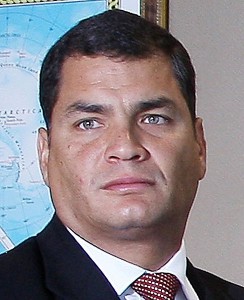Colombia: The FARC's Carrot-and-Stick Strategy
Summary

LUIS ROBAYO/AFP/Getty Images
A Colombian protester with a sign reading, "Release Them Right Now!" in Cali, Valle del Cauca department, Colombia
Iran: New Military Exercises, But No New Threat


EBRAHIM NOROOZI/AFP/Getty Images
An Iranian submarine during the Velayat 90 naval exercises in the Strait of Hormuz on Jan. 3
Geopolitical Calendar: Week of Feb. 27, 2012

Editor's Note: The
following is an internal Stratfor document listing significant meetings
and events planned for the next week. Stratfor analysts use this
document to stay informed of the activities and travel of world leaders
and to guide their areas of focus for the week.
The Myth of the End of Terrorism. By Scott Stewart

In this week's Geopolitical Weekly, George Friedman discussed the geopolitical cycles that change with each generation. Frequently, especially in recent years, those geopolitical cycles have intersected with changes in the way the tactic of terrorism is employed and in the actors employing it.
The Arab terrorism that began in the 1960s resulted from the Cold War and the Soviet decision to fund, train and otherwise encourage groups in the Middle East. The Soviet Union and its Middle Eastern proxies also sponsored Marxist terrorist groups in Europe and Latin America. They even backed the Japanese Red Army terrorist group. Places like South Yemen and Libya became havens where Marxist militants of many different nationalities gathered to learn terrorist tradecraft, often instructed by personnel from the Soviet KGB or the East German Stasi and from other militants.
The State of the World: Explaining U.S. Strategy
The State of the World: Explaining U.S. Strategy

The fall of the Soviet Union ended the European epoch, the period in which European power dominated the world. It left the United States as the only global power, something for which it was culturally and institutionally unprepared. Since the end of World War II, the United States had defined its foreign policy in terms of its confrontation with the Soviet Union. Virtually everything it did around the world in some fashion related to this confrontation. The fall of the Soviet Union simultaneously freed the United States from a dangerous confrontation and eliminated the focus of its foreign policy.
Somali Piracy Update: The End of Monsoon Season
Somali Piracy Update: The End of Monsoon Season
Summary

U.S. Navy via Getty Images
A U.S. Navy warship rescues an Iranian fishing boat crew held by pirates Jan. 5
Analysis
Polarization and Sustained Violence in Mexico's Cartel War

As we noted in last year's annual cartel report, Mexico in 2010 bore witness to some 15,273 deaths in connection with the drug trade. The death toll for 2010 surpassed that of any previous year, and in doing so became the deadliest year ever in the country's fight against the cartels. But in the bloody chronology that is Mexico's cartel war, 2010's time at the top may have been short-lived. Despite the Mexican government's efforts to curb cartel-related violence, the death toll for 2011 may have exceeded what had been an unprecedented number.
Monday, February 27, 2012
The Mayan 'Decline' and Small Horses ... More Climate Change Propaganda?
– by Anthony Wile

Anthony Wile
Once more we're reading about the terrible toll that global warming can take. In this case, we're being led to understand that it may have resulted in the demise of a great, ancient civilization and also the reduction in size of various noble mammals.
Mark Tier on Effective Investing, Where the World Is Headed and Why Financial Literacy Helps
– with Anthony Wile

Mark Tier
Introduction: Mark Tier is an Australian based in Hong Kong partly because “paying taxes is against my religion.” Founder and (until 1991) publisher of the investment newsletter World Money Analyst, he’s the author of Understanding Inflation, How To Get A Second Passport, The Nature of Market Cycles and The Winning Investment Habits of Warren Buffett & George Soros. His latest works are entirely outside the investment field: When God Speaks for Himself: The Words of God You’ll Never Hear in Church or Sunday School (written with George Forrai), and the just-published Trust Your Enemies, a political thriller, a story of power and corruption, love and betrayal − and moral redemption ...
Why Freedom?
– by Tibor Machan

Dr. Tibor Machan
Few can deny that human beings care about liberty. There are, of course, different senses in which the term "liberty" is used. One sense of it means being without obstacles in life; another, to be able to develop fully with as little hindrance as can be achieved through collective action; or, again, to have the chance to obtain from others their surplus wealth and labor-power.
The Secret Media War of 2012
– by Ron Holland

Ron Holland
We are currently in the middle of the long war of the Internet Reformation, although the press will never mention this. Effectively, there has been an ongoing war between the non-controlled alternative media and the establishment media since the inception of LewRockwell.com in 1999. Since then many quality alternative media websites have been added to the competition while the elite media's credibility, reach and ability to manipulate debate and public opinion has been declining. The Internet Reformation is slowly winning and to date, this has been shown most clearly with the 2012 Ron Paul presidential campaign.
The GOP neocon puppet-masters are terrified, especially when Republican crowds at televised debates cheer Ron Paul's non-interventionist foreign policy remarks because this threatens their control over US foreign policy in what was formerly their secure home turf. Try as they might the media has not been able to destroy the Ron Paul Campaign.
Economy Squeezed As Debt Accelerates
– by Ron Paul

Dr. Ron Paul
The Naked and the Dead: Weegee’s Lessons for Today
One of the 20th century’s
best-known cultural entrepreneurs was a proud member of the 99 percent:
Arthur Fellig, better known as Weegee.
Weegee (Arthur Fellig) began his career as a photographic outsider, or rather as a previously anonymous insider, a darkroom technician at photography studios and newspapers. Ever since leaving school at 14 and running away from home at 18, often living on the streets, Fellig had worked at a series of unskilled jobs before learning the already obsolescent art of tintype.
Economics: A Million Mutinies Now
There are now so many versions
of ‘what's wrong with the economics profession’ that, with apologies to
V.S. Naipaul, I could describe the state of economics as one of a
million mutinies.
Argentina: Don’t lie to me – The Economist
 Why we are removing a figure from our indicators page
Why we are removing a figure from our indicators pageImagine a world without statistics. Governments would fumble in the dark, investors would waste money and electorates would struggle to hold their political leaders to account. This is why The Economist publishes more than 1,000 figures each week, on matters such as output, prices and jobs, from a host of countries. We cannot be sure that all these figures are trustworthy. Statistical offices vary in their technical sophistication and ability to resist political pressure. China’s numbers, for example, can be dodgy; Greece underreported its deficit, with disastrous consequences. But on the whole government statisticians arrive at their figures in good faith.
US: Greek ruins, American-style – by Jeffrey T. Kuhner
 President
Obama’s budget puts America on the path toward Greece. It is a reckless
document, a stunning betrayal of U.S. economic interests. By its own
numbers, Obamanomics leads to national bankruptcy. Unless there is a
dramatic course correction, we will share the bleak fate of the Greeks:
riots, chaos and internationally imposed austerity measures. We, too,
are committing fiscal suicide.
President
Obama’s budget puts America on the path toward Greece. It is a reckless
document, a stunning betrayal of U.S. economic interests. By its own
numbers, Obamanomics leads to national bankruptcy. Unless there is a
dramatic course correction, we will share the bleak fate of the Greeks:
riots, chaos and internationally imposed austerity measures. We, too,
are committing fiscal suicide.US: If Economy’s Improving, Why Is Dependency Growing? – by Eric Singer
 The
government is at full throttle to present the economy as improving
especially in light of the upcoming election. At the same time, there
has been a stunning rise in dependency as most recently presented by the
Heritage Foundation.
The
government is at full throttle to present the economy as improving
especially in light of the upcoming election. At the same time, there
has been a stunning rise in dependency as most recently presented by the
Heritage Foundation.Lesson for Obama: Greece’s Bailout Socialism Penalizes Youth Most – Investors.com
 Socialism: Rational
or not, Greece’s street riots and emigration rates signify one thing:
Socialism offers very little to the young. So why is the EU’s $172
billion bailout geared toward saving so much of the failed socialist
system?
Socialism: Rational
or not, Greece’s street riots and emigration rates signify one thing:
Socialism offers very little to the young. So why is the EU’s $172
billion bailout geared toward saving so much of the failed socialist
system?As Europe prepares to deliver a historic $172 billion bailout to Greece in a deal announced Monday, it’s pretty much a given that the austerity conditions required, in the absence of a true free market, will hit youth hardest. Athens will be trashed by another youth rampage, as many youths blame the pain on something other than Greece’s deeply rooted socialism.
Argentina: Omnipotencia – por Vicente Massot & Agustín Monteverde
 Nada
cambiará demasiado en los próximos meses en nuestro país. No hay
razones de ninguna naturaleza como para imaginar siquiera la posibilidad
de una modificación del rumbo político que incluye, por supuesto, otros
aspectos de la realidad —el económico y el social— a los cuales siempre
es necesario tener en cuenta.
Nada
cambiará demasiado en los próximos meses en nuestro país. No hay
razones de ninguna naturaleza como para imaginar siquiera la posibilidad
de una modificación del rumbo político que incluye, por supuesto, otros
aspectos de la realidad —el económico y el social— a los cuales siempre
es necesario tener en cuenta.Aun cuando a los defensores del modelo vigente esta aseveración les resulte enojosa y la reputen de antojadiza, lo cierto es que el éxito kirchnerista debe reconocerse tributario de la Diosa Soja y de la estabilidad brasileña. El precio de aquélla —que en algún momento amenazó bajar a menos de U$ 400 la tonelada— está de nuevo orillando los U$ 475, y en cuanto al gigante vecino su moneda luce fuerte.
Ecuador: Rafael Correa: El déspota ilustrado – por José Villaorduna
 El predidente que mete el dedo como si cantase un bolero.
El predidente que mete el dedo como si cantase un bolero.Su voz afranelada y modales palaciegos no deben conducir al engaño: a este doctor en economía no le tiembla la mano a la hora de ordenar el arresto de quienes lo critican o de pedir millonarias indemnizaciones en defensa de su honor. Y por qué no, también de la “seguridad económica” de su familia, como confesó en algún momento.
Venezuela: 69.8% de los venezolanos podría votar por Henrique Capriles Radonski para presidente – Globovisión
 En
un estudio de opinión realizado por el Instituto Delphos, 69.8% de los
venezolanos considera que Henrique Capriles Radonski, candidato de la
Unidad a las elecciones presidenciales, es una buena opción para votar
los comicios presidenciales del 07 de octubre. Por su parte, 24.8% de
las personas encuestadas aseguraron que no lo consideran como una opción
para darle su voto.
En
un estudio de opinión realizado por el Instituto Delphos, 69.8% de los
venezolanos considera que Henrique Capriles Radonski, candidato de la
Unidad a las elecciones presidenciales, es una buena opción para votar
los comicios presidenciales del 07 de octubre. Por su parte, 24.8% de
las personas encuestadas aseguraron que no lo consideran como una opción
para darle su voto.Peru: “Artemio”, sin arte ni parte – por Eugenio D´Medina Lora
 La
caída de Artemio en Santa Rosa de Mishoyo, más allá de si fue resultado
de las pesquisas de inteligencia o de la compra de voluntades por
efecto de una recompensa, puede marcar un importante hito en la lucha
ideológica contra Sendero Luminoso, y de paso, contra el MRTA y todos
los grupos inspirados en el marxismo duro.
La
caída de Artemio en Santa Rosa de Mishoyo, más allá de si fue resultado
de las pesquisas de inteligencia o de la compra de voluntades por
efecto de una recompensa, puede marcar un importante hito en la lucha
ideológica contra Sendero Luminoso, y de paso, contra el MRTA y todos
los grupos inspirados en el marxismo duro.Colombia: Las ‘petraseadas’ de Petro – por Gina Parodi

Foto: Héctor Fabio Zamora / EL TIEMPO
En los primeros 50 días de mandato del alcalde Petro ya podemos
inferir cómo será el resto de su mandato porque, como bien lo dice la
sabiduría popular, “en el desayuno se puede saber cómo será el
almuerzo”. A continuación tenemos apenas un recuento de promesas del
Alcalde en campaña y las ‘patraseadas’ o ‘petraseadas’, que empiezan a
multiplicarse.
The Objectives of Currency Devaluation Mises Daily: by Ludwig von Mises

[Human Action (1949)]
In the boom period that ended in 1929, labor unions had succeeded in
almost all countries in enforcing wage rates higher than those which the
market, if manipulated only by migration barriers, would have
determined. These wage rates already produced in many countries
institutional unemployment of a considerable amount while credit
expansion was still going on at an accelerated pace.When finally the inescapable depression came and commodity prices began to drop, the labor unions, firmly supported by the governments, even by those disparaged as antilabor, clung stubbornly to their high-wages policy. They either flatly denied permission for any cut in nominal wage rates or conceded only insufficient cuts. The result was a tremendous increase in institutional unemployment. (On the other hand, those workers who retained their jobs improved their standard of living as their hourly real wages went up.)
The Irrelevance of Worker Need and Employer Greed in Determining Wages Mises Daily: by George Reisman
[This article is adapted from a section of Chapter 14, specifically pp. 613–18, of the author's Capitalism: A Treatise on Economics (Ottawa, Illinois: Jameson Books, 1996).]

Obama's Traveling Tax-Break Show: The Ticker

By
Caroline Baum
I've been listening to President Barack Obama's
stump speech for a few weeks now. You know, the one where the
president, having been fully briefed on Company Fill-in-the-Blank's
business, lands at its Midwest plant and gets the crowd oohing and
ahhing with promises of special tax breaks for domestic manufacturers.
Tax Cuts Should Create Growth, Not Junk Spending: Amity Shlaes
Payroll-tax cut equals growth.
Consumer spending equals growth. Consumer spending is 70
percent of the economy. All growth is equal.
These are the axioms that motivated lawmakers to secure an extension of a payroll-tax cut this month. They felt like heroes for passing and signing a temporary break allowing citizens to skip Social Security payments.
President Barack Obama, too, was pleased. He trumpeted the payroll-tax news when he was visiting a Boeing Co. (BA) plant in Washington. An aim of that trip was to persuade American companies to do more business in America. In fact, by even going to Washington, Obama was highlighting what the administration believes is Boeing’s shame: Boeing does business offshore. But Obama took the time to go off message and praise Congress on the payroll-tax issue.
These are the axioms that motivated lawmakers to secure an extension of a payroll-tax cut this month. They felt like heroes for passing and signing a temporary break allowing citizens to skip Social Security payments.
President Barack Obama, too, was pleased. He trumpeted the payroll-tax news when he was visiting a Boeing Co. (BA) plant in Washington. An aim of that trip was to persuade American companies to do more business in America. In fact, by even going to Washington, Obama was highlighting what the administration believes is Boeing’s shame: Boeing does business offshore. But Obama took the time to go off message and praise Congress on the payroll-tax issue.
Weiss: Ayn Rand Beats Rick Santelli as First Teapartyer

Illustration by Allison Krumwiede
By
Gary Weiss
The origins of the Tea Party are
usually traced to Rick Santelli’s televised rant, which took
place on Feb. 19, 2009 -- by coincidence exactly 83 years to the
day after Ayn Rand first set foot on American soil. A few anti-
tax, anti-government rallies preceded the Santelli tirade, but
he and his immediate predecessors usually get the nod for
originating the movement.
Can You Pass the ‘Beverly Hillbillies’ Test?: Virginia Postrel

Illustration by O.O.P.S.
By
Virginia Postrel
Charles Murray knows that people who
read fat books of social criticism aren’t normal. They weren’t
normal when the books had titles like “The Affluent Society,”
“The Hidden Persuaders” and “The Organization Man,” and they
aren’t normal today.
Sunday, February 26, 2012
Obamacare and Involuntary Servitude
– by Tibor Machan

Dr. Tibor Machan
What If Democracy Is Bunk?
– by Andrew Napolitano

Andrew Napolitano
500 Year Old Global 'Roll-Up' Founders?
– by Anthony Wile

Anthony Wile
Is it possible that the biggest roll-up in history is foundering?
What roll-up? Well ... roll-up, of course, is a money-industry term of art. It means that someone − an enterprising banker backed by big money − begins to buy up mom and pop shops to turn them into one large industry with "economies of scale" and an intrinsic value that is larger than its individual moving parts.
In this case, the roll-up that is taking place is of nation-states.
The bankroll comes from central banks.
Six Reasons Why the Wars We Wage Often Go Wrong. by Jim Powell
Drums are beating for a pre-emptive war to take out
such nuclear facilities as Iran might have. But considerable caution is
in order, because this is basically the same story Americans heard not
so long ago, in 2003, to promote the pre-emptive war against Iraq.
Although the United States “won” that war, intelligence about Iraq’s
alleged weapons of mass destruction turned out to be wrong, the killing
has gone on for nearly a decade, Sunni and Shiite factions appear to be
going at each other again, and with Saddam Hussein gone, there’s a
political/military vacuum that Iraq’s larger neighbor Iran is
undoubtedly eager to exploit.
The calls for another pre-emptive war are particularly ironic
considering that Iran used to be a friend of the United States. Our CIA
helped the Shah secure his power in 1953, because he helped prevent
Soviet penetration of the Mideast. But the Shah went on to establish a
secular, authoritarian regime that made plenty of enemies. Ayatollah
Khomeini became one of the Shah’s most formidable enemies as early as
the 1960s. Because the U.S. backed the Shah, his enemies became our
enemies, and they unexpectedly seized power in 1979. The U.S. affirmed
its status as an enemy by backing Saddam Hussein after he attacked Iran
the following year, in what became an eight-year blood bath.Iranian leaders have done just about everything to convince the world that they are a bunch of dangerous fanatics, so the prospect of a nuclear Iran is scary. But by now we ought to have learned that a pre-emptive war can multiply the complications.
Wars Should Be Hard to Start. by Benjamin H. Friedman
The New York Times' report on Special
Operation Command's proposal for more authority to deploy troops never
quite says what new powers are sought. That vagueness, combined with the
murky existing law on deploying special operations forces outside war
zones, makes evaluating the proposal tough.
What is clear is that it is already too easy to deploy special operations forces on lethal missions. According to the Times,
12,000 special operators are deployed abroad and have operated in 70
nations in the last decade. Other reports claim that special operations
forces have lately conducted operations in Syria, Nigeria, Iran,
Algeria, and even Peru. In some cases, the special operators are
reportedly collecting intelligence, a job various intelligence agencies
already have. In others, the special operations forces are seemingly
committing acts of war, which should require explicit congressional
approval.The USA And Europe: A Graphical Status Report. by Steve H. Hanke
In the wake of an extreme economic event, such as the
Panic of 2008, everyone wants to know where we are going. To get a
handle on that, we must first understand where we have been. The ability
to interpret and understand economic data in terms of patterns,
relationships, connections and structures that are likely to prevail in
the future is critical if we are to make sound economic decisions today.
Accurate topological patterns — in short, good diagrams — hold the keys
to developing useful images of the future. To that end, a series of
charts are presented for both the United States and Europe.

We're Already Europe. by Michael D. Tanner
With seemingly every day bringing more bad news from
Europe, many are beginning to ask how much longer the United States has
before our welfare state follows the European model into bankruptcy. The
bad news is: It may already have.
This year, the fourth straight year that we borrowed more than $1
trillion to support the U.S. government, our budget deficit will top
$1.3 trillion, 8.7 percent of our GDP. If you think that sounds bad,
it’s because it is. In fact, only two European countries, Greece and
Ireland, have larger budget deficits as a percentage of GDP. Things are
only slightly better when you look at the size of our national debt,
which now exceeds $15.3 trillion, 102 percent of GDP. Just four European
countries have larger national debts than we do — Greece and Ireland
again, plus Portugal and Italy. That means the U.S. government is
actually less fiscally responsible than countries like France, Belgium,
or Spain.The Government and the Currency

[Human Action (1949)]
Media of exchange and money are market phenomena. What makes a thing a
medium of exchange or money is the conduct of parties to market
transactions. An occasion for dealing with monetary problems appears to
the authorities in the same way in which they concern themselves with
all other objects exchanged, namely, when they are called upon to decide
whether or not the failure of one of the parties to an act of exchange
to comply with his contractual obligations justifies compulsion on the
part of the government apparatus of violent oppression. If both parties
discharge their mutual obligations instantly and synchronously, as a
rule no conflicts arise which would induce one of the parties to apply
to the judiciary. But if one or both parties' obligations are temporally
deferred, it may happen that the courts are called to decide how the
terms of the contract are to be complied with. If payment of a sum of
money is involved, this implies the task of determining what meaning is
to be attached to the monetary terms used in the contract.The Transition to Monetary Freedom

[The Case for Gold (1982)]
Specific Reforms Required
The growth of the American government in the late 19th and 20th centuries is reflected in its increasing presence and finally monopolization of the monetary system. Any attempt at restoring monetary freedom must be part of a comprehensive plan to roll back government and once again confine it within the limits of the Constitution. That comprehensive plan may be divided into four sections: monetary legislation, the budget, taxation, and regulation. We shall begin with monetary reforms, and conclude with a word about international cooperation and agreement.What You're Not Supposed to Know about War
It is a testament to the power of government propaganda that several generations of self-described conservatives have held as their core belief that war and militarism are consistent with limited, constitutional government. These conservatives think they are "defending freedom" by supporting every military adventure that the state concocts. They are not.
Even just, defensive wars inevitably empower the state far beyond anything any strict constructionist would approve of. Prowar conservatives, in other words, are walking contradictions. They may pay lip service to limited constitutional government, but their prowar positions belie their rhetoric.
The Future of the Euro

The Fall of Communism in Virginia. by Murray N. Rothbard

[Conceived in Liberty (1975)]
In fact, the Virginia colony was not doing very well in drawing
off England's surplus poor. Besides transporting vagrants and criminals
to Virginia, the London Company and the City of London agreed to
transport poor children from London to Virginia. However, the poorest
refused the proffered boon and the company moved to obtain warrants to
force the children to migrate. It seemed, indeed, that the Virginia
colony, failing also to return profits to the company investors, was
becoming a failure on every count.The survival of the Virginia colony hung, in fact, for years by a hair-breadth. The colonists were not accustomed to the labor required of a pioneer, and malaria decimated the settlers. Of the 104 colonists who reached Virginia in May 1607, only 30 were still alive by that fall, and a similar death rate prevailed among new arrivals for many years. As late as 1616, only 350 colonists remained of a grand total of over 1,600 immigrants.
Mitt Romney and the car industry
A Detroiter in his own mind
by R.M. | WASHINGTON, DC
 ONE
of Mitt Romney's problems is that he lays it on too thick. He's not
just a conservative, he's a "severe conservative". He feels your pain
because he too is "unemployed". And he understands America's car
industry because he's a Tigers-cheering motorhead, a true "son of
Detroit".
ONE
of Mitt Romney's problems is that he lays it on too thick. He's not
just a conservative, he's a "severe conservative". He feels your pain
because he too is "unemployed". And he understands America's car
industry because he's a Tigers-cheering motorhead, a true "son of
Detroit".That last assertion comes in an op-ed Mr Romney wrote for the Detroit News today. And it's not untrue, per se. The candidate was born in Detroit, though he grew up in Bloomfield Hills, one of America's wealthiest cities. He probably cheered for the Tigers as a kid, but his position has since evolved. And cars may really be "in my bones", as he claims, but he advocated letting Detroit go bankrupt in 2008.
The Santorum surge
The Republican nomination
Far from uniting behind Mitt Romney, the Republicans may bicker for months
LAS VEGAS |
 Next stop, Michigan
Next stop, Michigan The hands that prod, the wallets that feed
Campaign finance
Super PACs are changing the face of American politics. And it may be impossible to reverse their startling advance
WASHINGTON, DC |

The Greek crisis
The Greek crisis
The end of the marathon?
by The Economist | BRUSSELS
 “I
HAVE learnt that marathon is indeed a Greek word.” Thus spoke Olli
Rehn, the European monetary affairs commissioner, at the end of a
14-hour negotiating session that produced a second bailout package for
Greece this morning.
“I
HAVE learnt that marathon is indeed a Greek word.” Thus spoke Olli
Rehn, the European monetary affairs commissioner, at the end of a
14-hour negotiating session that produced a second bailout package for
Greece this morning.
This had been agreed
in principle at a European summit in July last year. But political
turmoil in Greece, hesitation in the euro zone—and an ever-worsening fiscal hole caused by an ever-deepening recession—made the deal elusive for months.

No comments:
Post a Comment